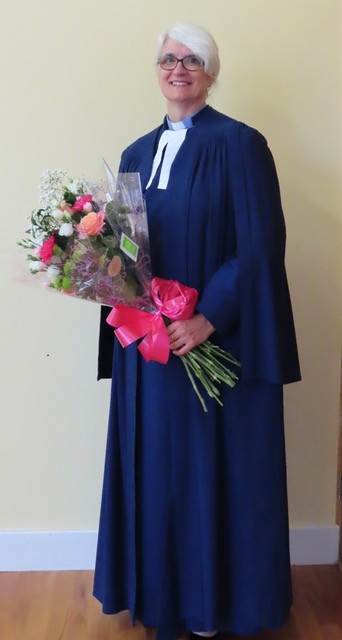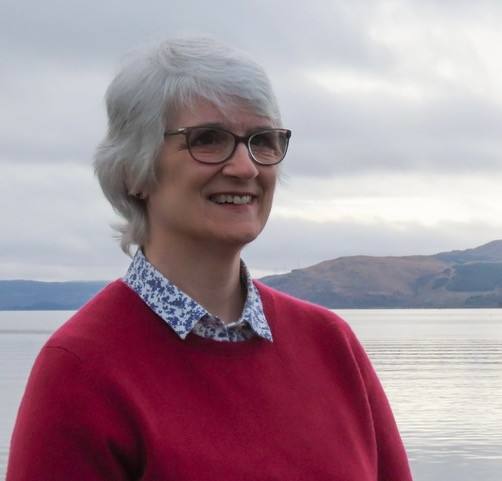April 2025: Rev Hilda Smith
The Church of Scotland's Talking Ministry monthly series shares personal stories from those serving in Christian ministry, along with resources filled with questions, prayers and reflections to help encourage reflection on how God might be calling you at this time
For April, Rev Hilda Smith looks back at a career which ranged from city ministry in Glasgow to serving in a rural parish in Argyll, as well as experience as a hospital chaplain in the former Yorkhill NHS Trust.
My ministry: Rev Hilda Smith
Rev Hilda Smith was ordained and inducted into her first charge of Drumry: St. Mary's in Drumchapel, Glasgow in 1992 and remained there until the start of the new millennium. Following four-and-a-half years as chaplain in the Yorkhill NHS Trust in Glasgow, she moved to Argyll to become minister in Lochgilphead Parish Church in 2005. Miss Smith took early retirement from the charge in August 2016. She still lives in the area where she devotes much of her time to creating and teaching coloured pencil art. For her that has become a supportive ministry. You can see some of her work and learn about her Fyne Art Community at www.hildasmithfyneart.co.uk.
When did you feel called to ministry?

I studied French and German at Glasgow University and my plan was to teach those languages but a diagnosis of Multiple Sclerosis (MS) – by elimination of all other possibilities – in Senior Honours, combined with a bad reaction to a lumbar puncture, changed everything.
I realised how suddenly and drastically life could change for all of us. We can lose our sight, the ability to move around, family, friends, home and career. The only thing that cannot be taken from us is our faith, so that was worth sharing.
I started thinking about the possibility of ministry, but not as an ordained minister! I had never even done a reading in church and didn't want to be up front, so I considered the diaconate.
I got knocked back by the committee as they believed I was headed for the ordained ministry. I resisted, but after my finals were over, I visited the divinity faculty at Glasgow University to talk things through. I never expected to be offered a place, but was told I would be accepted automatically because I was already a Glasgow graduate. I knew I wouldn't get a grant as I hadn't been to selection school, but was told I would get a second first degree bursary. I could have taught Moses a thing or two about making excuses, but despite my resistance, every door opened and I walked through. The MS diagnosis no longer stands, thanks to technological advances.
What have been the high points of your ministry career?
My first charge was in Drumchapel, an urban priority prea in Glasgow, and I loved it.
Connecting with people in Drumchapel was, in many ways, easy. The problems were obvious and people were open and welcoming of me as their minister, even if they only ever attended funerals.
There were so many opportunities to offer both pastoral and practical support. We had numerous clubs organised for children and youth, and both came pouring through the doors. Changed days! We had after school clubs offering support with homework before doing crafts and games and rounding off with a meal. We had a youth Sunday morning breakfast club and other youth clubs and groups throughout the week. All of those groups provided such strong connections that when a crisis arose, I wasn't arriving in their homes as a stranger, but as a friend.
Pastoral work within the parish was always my forte.
It was a real privilege to be allowed to share in people's lives at the most horrendous of times as well as in much happier times. Parish funerals were always important to me and such an opportunity to offer people the hope of our Christian faith when they were floundering and had no idea which way to turn.
I started up a support group for the parents of addicts and one of those who attended was a mother from Bearsden. One thing she said stuck with me: "We have all the same problems in Bearsden as exist in Drumchapel. They are just hidden under plush carpets." As I said, it was "easy" to minister in Drumchapel because the problems were obvious and people were much more open.
I also had a really strong connection with the local primary school. The door was always open to me. I was able to support staff in and out of the classroom – even teaching German to the P7s. The head teacher used me where appropriate and I was happy to help in whatever way I could. I went on school trips and staff nights out and a number of us even held games' nights in our own homes. Good friendships were formed back then.
A real highlight was the Urban Holiday Week to Carberry where faith was expressed through various creative avenues, and our families and children loved them.
Family services were another highlight and I owe a great deal to Elsie Moir who in the early days stepped in to support our work along with Magda Scott who taught in the local primary.
I had been in Drumchapel for eight-and-a-half years when life took an unexpected turn.
I had had no thoughts of leaving, but in 2001 I was told that Yorkhill was advertising for a full-time hospital chaplain. The pull was too great. I had wanted to apply for a post as a hospital chaplain at the start of my ministry but it was stipulated back then that you had to have a minimum of five years in a parish before applying. In the end, two posts were created and I was delighted to be given one of them.
I was known as the ‘Balloon Lady' by both parents and children. I was someone who helped both parents and children relax and enjoy some downtime. Good relationships were built and if and when the need arose for me to take on a different role, that relationship was already established.
In both Yorkhill and the parish, there were really tough times, but there were many good times, too. We made the most of those because we never knew what was around the corner.
After city ministry, was moving to Argyll very different?

It was like chalk and cheese. I didn't get off to the best start, though. I came to Lochgilphead in 2005 and in the following three years, I suffered two very significant losses which changed my life forever. It was a dreadful time, but I was surrounded by lovely people and a very supportive congregation which allowed me, eventually, to rebuild my life.
The same problems existed In Lochgilphead as were in Drumchapel, but the minister was no longer the first port of call. Times had changed. We did our best for families by offering a parent and toddler group and Messy Church but we were competing with so many other organisations which took precedence over everything organised by the church. It was very much a time of planting seeds and praying that at some point in the future, faith would grow.
While lockdown was a very difficult time for many, we were very fortunate in this area. Personally, lockdown offered me a break from tradition and the opportunity to do things differently and to reach many who didn't attend worship with our weekly written reflection on Facebook and posts on Facebook and YouTube.
Was there anything else during your ministry that had an impact on how you view your ministry and faith?
The Mid-Argyll Churches had a partnership with Lilongwe Congregation in Malawi which was amazing.
There were exchange visits which were amazing for all those involved. I went on the second group visit and then returned for their 10th anniversary on my own and had the delight of singing in Chichewa and Tumbuka with one of their choirs. A group of us even attempted to learn Chichewa which was definitely a challenge!
It's impossible to fully grasp the difference between life here and life there unless you see it for yourself, but even then, we were fed and watered and had a roof over our heads and mosquito nets. Poverty takes on a whole new meaning when you are in Malawi.
However, all I heard in Malawi was: "God is good." Many have little or no money and as a result limited access to education and health care. Many also struggle to feed their families and yet they say: "God is good."
We are the ones who should be saying that, but we don't realise how blessed we are. The churches in Malawi are packed and new churches are frequently planted in communities and each one grows. What struck me was that not only did the sun shine around them but the Son – as in Jesus – shone out of them. They have such a strong faith and love for Jesus. I envied what they had.
I did have the privilege of baptising 16 babies in one service which was a real blessing.
The minister knew how much I loved children so organised this for me without my knowledge: it was only 16 as the other 33 had been baptised earlier in the month!
Something else which struck me is the generosity of the people. They did not have much, but they gave hospitality so willingly, not just in their homes but in their congregations.
I have to say, though, that they work on Malawian time!
Just because a service is said to start at 7am doesn't mean it will. It might start before 8am on a good day! However, since some people walk at least three miles to get to worship, no-one worries.

Since you stepped down from full-time ministry, what has been keeping you motivated and enthusiastic?
I don't think you stop being a minister, but now it's part of who I am rather than what defines me.
My main focus now is on art. I was always rubbish at art in school but coloured pencil animal portraits is something I started doing after I retired and I love it. Anyone can learn to draw. All you need are a few simple techniques.
In June last year, I started to teach others to do what I do. I have students in the UK and Germany as well as a separate group of students in the USA who are mainly paramedical tattooists who wish to work with cancer patients.
Among my UK group are three ministers, who love it.
Teaching art online is my way of giving support and encouragement to those who wish to learn to draw for their own pleasure or to be able to help others.
That aside, there are real mental health benefits and, as pastoral care has always been my strength, this is now my way of continuing to minister to others.
If there is any minister out there who would be interested in joining me, you don't need any drawing skills. It's not about talent. You will learn a few simple techniques and you will be blown away by what you can do in a short space of time.
You may say you don't have time. There is always time. You give constantly to others. This is down time for you. Reduce your time on social media. Stop watching news which drags you down. Skip all those things that will be bad for your mental health and start drawing and creating something which will give you and others pleasure.
Do you have any thoughts or advice you might want to share with ministers at the start of their journey?
My first thought is that you need to take care of yourself so that you can care for others. With multiple unions taking place, parishes are double or tripling in size. You can't do everything so prioritise. Get out and engage with people where they are and let others worry about buildings and business.
If we have to account for how we spent our ministry one day, God won't be asking guys how many meetings we attended or how much time we spent fundraising for building work.
If you feel called to ministry, it is a real privilege but it's not an easy road and, in my opinion, how we do ministry needs to change.
Path of Renewal offered hope for the future of the Church, but changing long held traditions is not easy. In many ways, change needs to happen outside our buildings as we become the Church among the people. How we do that is for you to work out as you go forward in your ministry.
Maybe we can no longer be the National Church. We don't have the people to cling to the past and what has become an institution. More restructuring and rebranding won't build the Church. It will cripple those of you within it unless you take good care of yourself.
If you are making decisions at General Assembly, don't just rubber stamp without thinking through the challenges of what you are deciding.
Don't demand change unless you have thought through the impact on people. How decisions are made needs to change. We are still trying to be something that we were in the past but are no longer.
Focus on people, on ministry, on outreach in the places and among the people who are loved by God.
More information
If you would like to consider how God might be calling you to serve at this time, you may want to discuss further with your minister or be in touch with your Presbytery to explore local opportunities.
If you are interested in exploring a call to the recognised ministries of the Church, you can find more information on our vocations page and can contact ministry@churchofscotland.org.uk for a Discernment Conversation with one of the Recruitment Team.